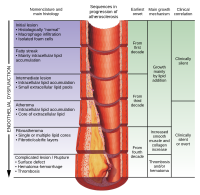
Photo from wikipedia
BACKGROUND The effects of e-cigarettes on endothelial function remained controversial. AIM The study aimed to investigate the effects of e-cigarettes on vascular endothelial function. METHODS PubMed, Web of Science, Embase,… Click to show full abstract
BACKGROUND The effects of e-cigarettes on endothelial function remained controversial. AIM The study aimed to investigate the effects of e-cigarettes on vascular endothelial function. METHODS PubMed, Web of Science, Embase, and Cochrane Library were searched up to December 2021. We only included the studies in which the control group included vaping without nicotine and tobacco. Pairwise and network meta-analyses were conducted for flow-mediated dilation (FMD), pulse wave velocity (PWV), and heart rate corrected augmentation index (AIx75). RESULTS Eight studies involving 372 participants were eligible for this review. Compared with vaping without nicotine, e-cigarettes significantly increase in PWV (Mean difference = 3.09; 95% Confidential Interval: 1.51 to 4.68, p < 0.001) and AIx75 (Mean difference = 2.11; 95% Confidential Interval: 1.02 to 3.21, p < 0.001) indicators, but not affect FMD (Mean difference = 0.78; 95% Confidential Interval: -0.08 to 1.64, p = 0.075). But compared with traditional tobacco, e-cigarettes did not affect FMD (Mean difference = 0.28, 95% Confidential Interval: -0.45 to 0.59, p = 0.084). According to SUCRA, The e-cigarette ranked first for FMD (SUCRA = 97%), tobacco ranked first for PWV (SUCRA = 75%), and AIX75(SUCRA = 99%). CONCLUSIONS In summary, evidence from our pooled analyses indicated that acute inhalation of e-cigarettes leads to negative changes in vascular endothelial function. E-cigarettes cannot be used as an alternative to public health strategies for tobacco control and should not be considered cardiovascular safety products. More future research should be conducted to verify our findings.
Journal Title: European journal of preventive cardiology
Year Published: 2022
Link to full text (if available)
Share on Social Media: Sign Up to like & get
recommendations!